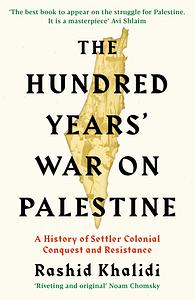Take a photo of a barcode or cover
challenging
reflective
sad
slow-paced
challenging
informative
slow-paced
informative
sad
slow-paced
challenging
reflective
sad
medium-paced
The Hundred Years’ War on Palestine is an accessible and informative recounting of the history of Palestine and the horrors that have been inflicted on the country. I really appreciated the way that this author wove in first-hand accounts of the events that he was writing about in this book. Khalidi doesn’t hold back on expressing the dismay, disgust, and frustration with the events of these events.
This is an excellent book to read if you’re looking to learn more about the history of Israel’s efforts to genocide Palestine, regardless of your level of knowledge.
This is an excellent book to read if you’re looking to learn more about the history of Israel’s efforts to genocide Palestine, regardless of your level of knowledge.
medium-paced
Strongly encourage everyone to check this book out to get a deeper understanding of the history of colonialism in Palestine, in addition to a better understanding of the roles the British and American governments played in it.
———
“Meanwhile, a massive wave of Jewish immigration as a result of persecution from the Nazi regime in Germany raised the Jewish population in Palestine from just 18 percent of the total in 1932 to over 31 percent in 1939.” (18)
“Such radical social engineering at the expense of the indigenous population is the way of all colonial settler movements. In Palestine, it was a necessary precondition for transforming most of an overwhelmingly Arab country into a predominantly Jewish state. As this book will argue, the modern history of Palestine can best be understood in these terms: as a colonial war waged against the indigenous population, by a variety of parties, to force them to relinquish their homeland to another people against their will.” (18-19)
“In the first decade of the twentieth century, a large portion of the Jews living in Palestine were still culturally quite similar to and lived reasonably comfortably alongside city-dwelling Muslims and Christians.” (33)
“In spite of marked religious distinctions between them and their neighbors, they were not foreigners, nor were they European or settlers: they were, saw themselves, and were seen as Jews who were part of the indigenous Muslim-majority society.” (33)
“After four hundred years, they were confronted by the disconcerting prospect of alien rule and the swift disappearance of Ottoman control, which had been the only system of government known for over twenty generations.” (39)
“The momentous statement made just over a century ago on behalf of Britain’s cabinet on November 2, 1917, by the Secretary of State for foreign affairs, Arthur James Balfour— what has come to be known as the Balfour Declaration— comprised a single sentence: His Majesty’s government view with favor the establishment in Palestine of a national home for the Jewish people, and will use their best endeavors to facilitate the achievement of this object, it being clearly understood that nothing shall be done which may prejudice the civil and religious rights of existing non-Jewish communities in Palestine, or the rights and political status enjoyed by Jews in any other country.” (40)
“The British government’s intentions and objectives at the time have been amply analyzed over the past century. Among its many motivations were both a romantic, religiously derived philo-Semitic desire to ‘return’ the Hebrews to the land of the Bible, and an anti-Semitic wish to reduce Jewish immigration to Britain.” (41)
“Britain primarily desired control over Palestine for geopolitical strategic reasons that antedated World War I and that had only been reinforced by wartime events.” (42)
“The Zionist Movement— sovereignty and complete control of Palestine.” (42)
“Churchill— assured Weizmann that by the term ‘Jewish National home’ they ‘always meant an eventual Jewish state.’ Lloyd George convinced the Zionist leader that for this reason Britain would never allow representative government in Palestine. Nor did it.” (43)
“After British troops occupied Jerusalem in December 1917, the military regime banned publication of news of the declaration. Indeed, the British authorities did not allow newspapers to reappear in Palestine for nearly two years. When reports of the Balfour Declaration finally reached Palestine, they trickled in slowly via word of mouth and then through copies of Egyptian newspapers that travelers brought from Cairo.” (44)
“Going into the post-war world, suffering from collective trauma, the people of Palestine faced a radically new reality: they were to be ruled by Britain, and their country had been promised to others as a ‘national home’. (47)
“Palestinian identity, much like Zionism, emerged in response to many stimuli, and at almost the same time as did modern political Zionism.” (49)
“This identity included a love of country, a desire to improve society, religious attachment to Palestine, and opposition to European control.” (50)
“Well-informed Palestinians were aware of what Zionists were preaching both abroad and in Hebrew in Palestine to their followers— that unlimited immigration would produce a Jewish majority that would permit a takeover of the country.” (53)
— will finish updating later
———
“Meanwhile, a massive wave of Jewish immigration as a result of persecution from the Nazi regime in Germany raised the Jewish population in Palestine from just 18 percent of the total in 1932 to over 31 percent in 1939.” (18)
“Such radical social engineering at the expense of the indigenous population is the way of all colonial settler movements. In Palestine, it was a necessary precondition for transforming most of an overwhelmingly Arab country into a predominantly Jewish state. As this book will argue, the modern history of Palestine can best be understood in these terms: as a colonial war waged against the indigenous population, by a variety of parties, to force them to relinquish their homeland to another people against their will.” (18-19)
“In the first decade of the twentieth century, a large portion of the Jews living in Palestine were still culturally quite similar to and lived reasonably comfortably alongside city-dwelling Muslims and Christians.” (33)
“In spite of marked religious distinctions between them and their neighbors, they were not foreigners, nor were they European or settlers: they were, saw themselves, and were seen as Jews who were part of the indigenous Muslim-majority society.” (33)
“After four hundred years, they were confronted by the disconcerting prospect of alien rule and the swift disappearance of Ottoman control, which had been the only system of government known for over twenty generations.” (39)
“The momentous statement made just over a century ago on behalf of Britain’s cabinet on November 2, 1917, by the Secretary of State for foreign affairs, Arthur James Balfour— what has come to be known as the Balfour Declaration— comprised a single sentence: His Majesty’s government view with favor the establishment in Palestine of a national home for the Jewish people, and will use their best endeavors to facilitate the achievement of this object, it being clearly understood that nothing shall be done which may prejudice the civil and religious rights of existing non-Jewish communities in Palestine, or the rights and political status enjoyed by Jews in any other country.” (40)
“The British government’s intentions and objectives at the time have been amply analyzed over the past century. Among its many motivations were both a romantic, religiously derived philo-Semitic desire to ‘return’ the Hebrews to the land of the Bible, and an anti-Semitic wish to reduce Jewish immigration to Britain.” (41)
“Britain primarily desired control over Palestine for geopolitical strategic reasons that antedated World War I and that had only been reinforced by wartime events.” (42)
“The Zionist Movement— sovereignty and complete control of Palestine.” (42)
“Churchill— assured Weizmann that by the term ‘Jewish National home’ they ‘always meant an eventual Jewish state.’ Lloyd George convinced the Zionist leader that for this reason Britain would never allow representative government in Palestine. Nor did it.” (43)
“After British troops occupied Jerusalem in December 1917, the military regime banned publication of news of the declaration. Indeed, the British authorities did not allow newspapers to reappear in Palestine for nearly two years. When reports of the Balfour Declaration finally reached Palestine, they trickled in slowly via word of mouth and then through copies of Egyptian newspapers that travelers brought from Cairo.” (44)
“Going into the post-war world, suffering from collective trauma, the people of Palestine faced a radically new reality: they were to be ruled by Britain, and their country had been promised to others as a ‘national home’. (47)
“Palestinian identity, much like Zionism, emerged in response to many stimuli, and at almost the same time as did modern political Zionism.” (49)
“This identity included a love of country, a desire to improve society, religious attachment to Palestine, and opposition to European control.” (50)
“Well-informed Palestinians were aware of what Zionists were preaching both abroad and in Hebrew in Palestine to their followers— that unlimited immigration would produce a Jewish majority that would permit a takeover of the country.” (53)
— will finish updating later
Prior to reading The Hundred Years’ War on Palestine I had some background from having read The Shortest History of Israel and Palestine, but Rashid Khalidi’s framing enriched my understanding. I was once again struck by how decisions like the Sykes-Picot Agreement (All done in the name of colonialism and profit) continue to play out in real people's lives. The lack of self-determination that the Palestinian people experience in their home country is striking and horrific. The ongoing genocide in Palestine feels like a modern version of Manifest Destiny: a belief in entitlement to land, regardless of who already lives there. This book is kicking off my reading focus for the back half of the year: a focus on colonialism's ongoing impact in shaping our modern world
let's see where this reading list takes me!
let's see where this reading list takes me!
challenging
informative
slow-paced
i definitely didn’t absorb everything but i thought the focus on palestine from a policy and international relations lens was unique. while i was familiar with the role of european nations and the usa in the formation of palestine, learning about other arab nations’ perspectives on the issue was new. very dry read but that’s to be expected
challenging
informative
reflective
slow-paced
challenging
informative
reflective
medium-paced





